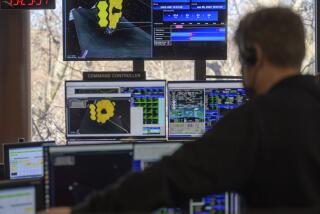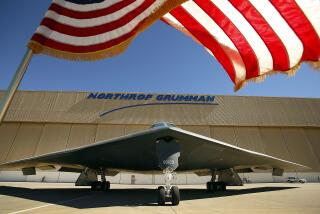Northrop Suffers Loss; Stealth Work Suspected : Analysts Say $30.5 Million in Red Ink Had to Come From $90-Million Charge on Secret Bomber Project
- Share via
Northrop posted a surprise $30.5-million third-quarter loss Tuesday because of a $90-million charge on its top-secret Stealth bomber program.
The Century City-based aerospace firm is prohibited from discussing details of the Stealth program, so it reported only that it took the writeoff on an unidentified long-term research and development contract. But the magnitude of the writeoff and the vaguely worded description of the contract in the firm’s earnings statement left little doubt in the minds of financial analysts that the charge was taken on the Stealth.
Northrop has been working on the Stealth, formally known as the Advanced Technology Bomber, at least since October, 1981, when the Air Force announced that Northrop was prime contractor of the new aircraft, an intercontinental nuclear bomber designed to be virtually undetectable by radar and infrared sensors.
“The contract we are talking about here is the advanced development contract for the Stealth,” said David J. Smith, aerospace analyst at the brokerage Sanford C. Bernstein & Co. “There have been indications that negotiations were going on with the Air Force in the past few months.”
Analysts said the writeoff reflects only one of two possible developments in the Stealth program: Either Northrop encountered technical problems that have reduced its incentive fees in a cost-plus type of contract, or the Air Force has forced it to share more of the cost of developing the Stealth.
“It is a significant hit,” said Wolfgang Demisch, aerospace analyst at First Boston. “Assuming that Northrop has done $3 billion to $4 billion of Stealth work so far, it represents a 2% to 3% downward revision.”
Indeed, the third-quarter red ink is believed to constitute the largest quarterly loss in Northrop’s history. The loss, which amounts to 65 cents a share, came on sales of $1.26 billion, up 4% from a year earlier.
While the company’s discussion of its writeoff makes no mention of it occurring in its aircraft business, an accompanying chart on various business segments shows that the aircraft business took a $44.1-million operating loss for the quarter. In contrast, electronics profits were up 35% to $23.5 million.
Despite the operating loss, Northrop’s aircraft business continued to grow significantly in the quarter, with a backlog of $2.6 billion on Sept. 30, a 26% increase in a year. In addition, analysts speculated that the writeoff and accompanying loss was not an indication that the Stealth program is in jeopardy. Nevertheless, Northrop stock dropped $1.25 a share to $43.50 in trading Tuesday.
Northrop’s official statement about the writeoff disclosed only that it was prompted by a reduction of the rate of profit accrual during the life of the long-term contract. It also said that future profits would be booked at lower margins.
“In accordance with its accounting policy,” the earnings statement said, “Northrop recognized in the third quarter the decrease in estimated operating margins now attributable to sales on this contract made over the entire period from the beginning of the contract through Sept. 30 of this year.
“Based on the current estimate of the final cost of the research and development work, the company expects that operating margin on this contract in future periods will be recorded at the same percentage as the newly adjusted margin rate,” the statement read.
Smith, the Sanford C. Bernstein analyst, said the writeoff also reflected the difficulty that a defense contractor normally experiences in a massive program that depends on significant technological advances. “You never get through such a technical development phase scot-free,” Smith said.
“The Air Force put expectations on this program that were going to be difficult to meet. You would have to expect adjustments somewhere along the line,” he added.
Gregory Kieselmann, an analyst at Morgan, Olmstead, Kennedy & Gardner, said the revision also demonstrated an increasingly harsh environment in the defense procurement system.
“We are not recommending shares of defense contractors any more,” Kieselmann said. “Almost all of them are having to revise their profits down.
“It is a sign that hard times are coming for these guys in the future,” he warned.
More to Read
Inside the business of entertainment
The Wide Shot brings you news, analysis and insights on everything from streaming wars to production — and what it all means for the future.
You may occasionally receive promotional content from the Los Angeles Times.











